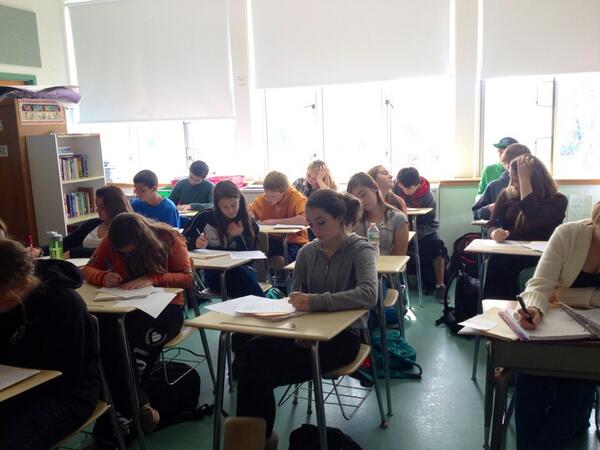Is School Choice No Longer a Choice?
Students at Pentucket tend to blame the district as a whole for the poor quality of some of its resources, but could the real culprits of this budget crisis hail from outside of Pentucket’s borders?
Pentucket has long been the countywide school of choice, opening its doors not only to its towns of Groveland, Merrimac, and West Newbury, but also to students residing in surrounding towns such as Georgetown, Haverhill, and Newburyport. These students, who seek a better education, must enter a lottery by filling out a simple application form that can be found on the district’s website.
The Pentucket school choice program gives students outside of the district the opportunity to achieve a better quality education. However, the program is currently being reevaluated.
Over the years, the number of school choice students at Pentucket has grown tremendously; from 92 out-of-district students in 2008 to 177 students in the 2012-2013 school year. This program not only benefits the student with a more focused education, but the district also receives $5,000 for each school choice student accepted into Pentucket.[1]
With close to 200 school choice students throughout the district, earning Pentucket almost $800,000, one might assume this extra money would be enough to at least pay for new books. However, the money received from school choice is being used as part of the district’s $37,082,877 aid from the state, rather than being used for additional funds.
It currently costs Pentucket an average of $11,821 to educate each of its students. However, after school choice students, and their income, are deducted, the cost to educate each student becomes $12,229. The school choice program thus creates a “negative financial impact on the school district.”[2]
Therefore, when determining the amount of money given to Pentucket by the state of Massachusetts, school choice money is included, which in the end, lowers the amount of money given by the state. To balance the money lost and the funds required, tax payers in the district towns must compensate these costs through taxes.
In an effort to gain more financial aid from the state and keep tax payers’ funds local, superintendent Jeffery Mulqueen believes the solution is to reduce about eight school choice positions each year. “If we have schools people want to attend, people will want to move [to Pentucket] and therefore pay local taxes,” says Dr. Mulqueen who instead of relying on school choice funds, wishes to create a World Class education system.
However, this World Class approach includes creating smaller class sizes, thus school choice students once again create a negative impact.
However, this proposal is not sitting quite right with school choice students currently attending Pentucket such as Cammi Balentine, a sophomore from Haverhill. Cammi attended Haverhill public elementary schools until she was accepted into the Dr. John C. Page School upon entering the fourth grade.
Cammi believes the large population in the Haverhill schools distracted her from her learning. “I was not fully prepared for fourth grade,” said Cammi. Much of the teachers’ time had been spent controlling and disciplining large classrooms, making it difficult for her to receive individualized learning.
However, upon attending Pentucket, Cammi, along with many other choice students, such as Katelin McSherry, a sophomore from Bradford, have received the academic environment and skills they need to succeed that were formerly unavailable to them.
Katelin believes, “Pentucket has a much higher quality of education than Haverhill did.” She also experienced a more comfortable environment at Pentucket when she was accepted as a school choice student for her Freshman year of high school, noting that the students and teachers create a welcoming community that makes for a “fantastic learning environment.”
Traci Balentine, a mother of two school choice students currently enrolled in Pentucket High School and Middle School, also disagrees with Mulqueen’s plan. She enrolled her two daughters in the school choice lottery hoping they would be able to experience Pentucket’s “smaller schools,” “better options,” and “better education.”
“There was no involvement from parents [at Haverhill public schools],” says Traci. Pentucket offered her and her family an environment where parents prioritized their children’s education and motivated students to do their best work and have consistent attendance.
Pentucket not only offers specialized programs for students with disabilities, but also adapts learning techniques to students who benefit from accelerated learning. Traci claims other schools do not “challenge accelerated students as much” as they need to be challenged. She believes there needs to be an equal balance between programs for students that require additional assistance and programs for students who need a more challenging curriculum.
Katelin relates, saying that her work is challenging, yet the teachers at Pentucket are always willing to provide assistance when needed.
Standing by Superintendent Mulqueen’s proposal however, is Michelle Hebert, a substitute teacher at Pentucket Regional High School and a 1985 graduate of Pentucket.
“We are at a $6,000 deficit,” says Hebert who believes if it cost the district towns so much money, it is simply “common sense” not to accept extra students from other schools. With all the money saved, “We can utilize these funds for newer technology for our students,” says Hebert, who also believes the school is “deeply in need of repairs.”
However, instead of just refusing to accept school choice students, Michelle believes there should be stricter guidelines for entering Pentucket, similar to those of scholarship applications. Such applications, could be “based upon academic records and community service,” offers Michelle.
Although the cost of the extra students is significant to the district’s budget, “My recommendation is not to eliminate school choice,” assures Dr. Mulqueen, who also guarantees that school choice students currently enrolled in Pentucket will continue to attend Pentucket until graduation.
“We are not anti-school choice,” says Dr. Mulqueen. “We are simply pro Pentucket.”
Although there is much dispute on this topic, ultimately, “If you want to learn, you will learn,” says Traci who believes the key to a good education is possessing the desire to explore and discover new things.
Solis, Jennifer. “Pentucket Superintendent: School Choice Costly for District.” Daily News. 8 Aug. 2013. http://www.newburyportnews.com/local/x1750258071/Pentucket- superintendent-School-choice-costly-for-district.
Mulqueen, Jeffery J, Ed. D. Letter to Members of the Pentucket Regional School Committee
regarding School Choice and International Students. 15 Jul. 2013.












Corey Corcoran • Oct 30, 2013 at 1:16 pm
Even though I am not from Groveland, West Newbury, or Merrimac I still believe that I am a Sachem. As a school choice student, the opportunity that I have had at Pentucket has been absolutely amazing. I was at Haverhill High for two years. I was involved in so much drama around the school. Transferring here was the start of a new beginning. In the article it says, “Such applications, could be “based upon academic records and community service.” If it was based off of that, I would have never gotten the opportunity that I have had at Pentucket. I did not have good grades. I barely passed my classes. As I stated before, coming to Pentucket was the start of a new beginning. I really appreciate the opportunity that I was given and I would hate to see other students be declined of school choice because of less school choice spots.
Alexis • Oct 21, 2013 at 12:48 pm
I believe that school choice should still be a choice throughout Pentucket. It gives people from outside the district to have the opportunity to experience what we have to offer. Getting rid of school choice eliminates the opportunity for students that are not fortunate enough to be able to live where we provide out school system. Even though it costs a little bit extra per student each year to provide school choice, we are still giving outside students the opportunity to use our curriculum.
Stephen Kolvek • Oct 20, 2013 at 1:49 pm
I feel like Dr. Mulqueen’s point of changing school choice to take less kids is an excellent idea. This will make getting into Pentucket from Haverhill competitive in a sense. I also like the idea of having smaller class sizes doing this will make learning much more 1 to 1 as opposed to 5 to 1. While is is unfortunate that kids from Haverhill won’t be able to get into Pentucket as easily as they would like to, we should put the money into making building renovations or buying books to make the learning environment better instead of more convenient. This way, if a student from Haverhill comes into the district their work to get in would have been even more worth it.
Alexis Moody • Oct 18, 2013 at 3:46 pm
I believe that the school choice is an opportunity for kids outside of the Pentucket district to experience what we have to offer. Yes it adds to the cost per student but in exchange for that it allows outside students to get the education skills that they’re looking for. If we have continued to have school choice over the years, why cut it off now?
Alan Barlow • Oct 15, 2013 at 10:20 pm
While it is hard to take the stance of supporting this decision because I have friends who have benefitted from school choice, I think this is a necessary step at this time. The first priority of the district should be the students it serves directly from the town that support it. Since this program is costing more money than it is bringing in, it does not seem like a good idea to keep. We must choose to cut programs like this in order to keep teaching positions and work on fixing the school. While hard to admit, I feel this is the right direction for our district in its path to a hopefully more financially sound future.